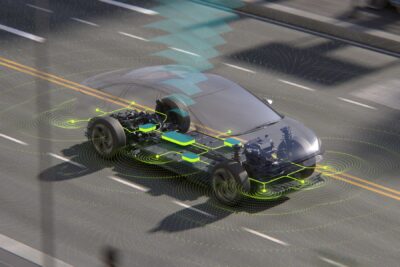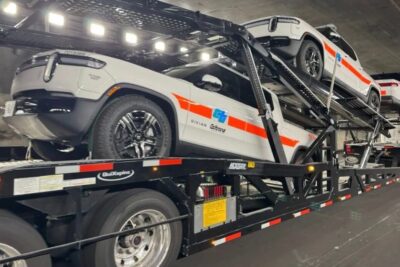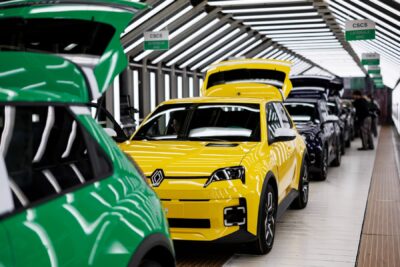VW y Rivian sacan conclusiones provisionales positivas sobre su empresa conjunta de software
Después de La propia división de software de Volkswagen, Cariad, llevaba años por debajo de las expectativas y era cualquier cosa menos eficiente, el fabricante de automóviles dio un giro estratégico de 180 grados tras el nombramiento de Oliver Blume como director general. En lugar de desarrollar el software de forma totalmente interna, el nuevo CEO de Volkswagen AG estableció asociaciones de gran alcance con otros fabricantes en este ámbito.
Mientras que en China, el fabricante nacional de alta tecnología Xpeng se encarga de garantizar que los sistemas de infoentretenimiento y asistencia de VW satisfagan las demandas de los clientes locales, se creó una empresa conjunta con el fabricante californiano de coches eléctricos Rivian para el software de los modelos occidentales.
Al parecer, hay varios puntos que suscitan debate
Sin embargo, ya en septiembre de 2025, tras la Movilidad IAAla publicación empresarial alemana Manager Magazin informó de tensiones entre los socios de cooperación. Éstas afectaban principalmente a la cooperación transatlántica entre VW y Rivian. El desarrollo del software avanzaba más lentamente de lo esperado, lo que también podría retrasar el lanzamiento al mercado de las series de modelos afectadas del Grupo VW.
Además, los algoritmos de Rivian no serían compatibles con los vehículos con motor de combustión. Dado que éstos van a desempeñar un papel más importante de lo previsto en Volkswagen en los próximos años, esto supone un grave problema para el gigante automovilístico alemán.
A esto se añaden las discusiones sobre hasta qué punto se permite a las marcas del Grupo VW adaptar el software de Rivian para sus modelos. Según el informe, como solución provisional, se ha llegado incluso a considerar la posibilidad de transferir de nuevo más responsabilidades a la división de software del propio Grupo, Cariad, que recientemente ha sufrido una importante reducción de personal.
Los socios de la cooperación parecen trabajar en armonía
Sin embargo, en el primer aniversario de su fundación, VW y Rivian hacen ahora un balance provisional positivo de la empresa conjunta conocida como "Rivian and Volkswagen Group Technologies", o "RV Tech" para abreviar, probablemente también para disipar cualquier rumor. Según los dos fabricantes, el desarrollo conjunto de la arquitectura electrónica zonal y el software asociado para los 'vehículos definidos por software' progresa adecuadamente.
Tras su introducción en los futuros modelos de producción, los clientes podrán disfrutar de funciones de conducción altamente automatizadas y de modernas funciones de infoentretenimiento. Gracias a las actualizaciones por aire de última generación, éstas se mantendrán al día incluso años después de la entrega, sin necesidad de llevar el vehículo al taller.
Volkswagen iniciará en breve las primeras pruebas de invierno
Las soluciones desarrolladas por RV Tech se utilizarán en los modelos del Grupo basados en la futura arquitectura SSP (Scalable Systems Platform) de Volkswagen. Para todas las marcas, la empresa con sede en Wolfsburg prevé un volumen total de 30 millones de vehículos para la nueva plataforma eléctrica.
Sin embargo, las tecnologías desarrolladas en el marco de la empresa conjunta también se utilizarán en las futuras series Rivian. El SUV de gama media R2 será el primero, seguido en 2027 por los dos crossover compactos R3 y R3X de estilo retro.
A partir de este invierno, el rendimiento de la tecnología desarrollada en el proyecto se pondrá a prueba en duras condiciones climáticas. En el primer trimestre de 2026, las marcas VW, Audi y Scout comenzarán sus exigentes pruebas de invierno para comprobar la resistencia del hardware a las bajas temperaturas. El ID. EVERY1, un prototipo del sucesor del VW e-Up, también se incluirá en las pruebas.
La tecnología debuta en el segmento de entrada de gama
El microcoche, que competirá con el nuevo Renault Twingo E-Tech Eléctrico en Europa a partir de 2027, ha sido sometido a una amplia gama de pruebas desde el verano en los laboratorios de desarrollo californianos de RV Tech en Palo Alto e Irvine. El pequeño coche, al que Volkswagen probablemente llamará ID.1 o ID.Up cuando se lance, es el primer modelo de producción que incorpora la arquitectura SDV.
Por ello, VW ha decidido desplegar sus tecnologías digitales del futuro en el segmento de entrada de gama, haciéndolas accesibles a un grupo objetivo lo más amplio posible. Sin embargo, la base técnica en este caso es la próxima plataforma de tracción delantera MEB+, adaptada a modelos más asequibles.
La plantilla de la empresa conjunta crece
La empresa conjunta crece sin cesar y cuenta ya con 1.500 empleados en todo el mundo. Entre bastidores, RV Tech trabaja ya en las siguientes fases de desarrollo de la arquitectura de hardware y software, que harán su debut en modelos más grandes basados en la plataforma SSP a finales de la década.
"Nuestra empresa conjunta con Rivian muestra cómo pensamos e implementamos el progreso en el Grupo Volkswagen: con rapidez, precisión y centrándonos en el cliente. La arquitectura de nuestros futuros vehículos definidos por software se está desarrollando allí a gran velocidad. Todos los pasos para alcanzar nuestros ambiciosos objetivos se están aplicando con determinación y concentración. En estrecha colaboración con nuestras marcas, en tan solo doce meses se ha creado una base tecnológica que permitirá una nueva experiencia de conducción digital para nuestros clientes a precios asequibles", declaró Oliver Blume, consejero delegado del Grupo VW.
El fundador y consejero delegado de Rivian, RJ Scaringe, añadió: "Estamos entusiasmados con el trabajo que está saliendo de nuestra empresa conjunta con el Grupo Volkswagen. RV Tech se ha desarrollado significativamente en los últimos doce meses y establecerá nuevos hitos en la tecnología del automóvil. En Rivian, esperamos con especial interés el lanzamiento al mercado del R2 en el primer semestre de 2026, que demostrará de forma impresionante los progresos realizados por la empresa conjunta."
Fuente: Información por correo electrónico en alemán
Este artículo fue publicado por primera vez por Elias Holdenried para la edición alemana de electrive.





0 Comentarios